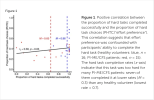Wyva
Senior Member (Voting Rights)
Andrew Kirvin-Quamme, Karen D. Kirke, Oscar Junge, Jonathan C. W. Edwards, Kevin J. Holmes
Introduction
In a recent, high-profile study of post-infectious myalgic encephalomyelitis/chronic fatigue syndrome (PI-ME/CFS), Walitt et al. (2024) assessed the performance of patients and healthy volunteers on the Effort-Expenditure for Rewards Task (EEfRT), among a host of other measures. The EEfRT is a widely used behavioral index of reward motivation and effort-based decision-making that requires repeatedly choosing between an easy task and a hard task, each involving rapid, repetitive button-pressing (Treadway et al., 2009). Walitt et al.'s study—the first to investigate effort-based decision-making in PI-ME/CFS—found that patients were less likely to choose the hard task than healthy volunteers. The authors interpreted this difference as evidence of altered “effort preference,” which they defined as “how much effort a person subjectively wants to exert” (p. 9). Walitt et al. concluded that “effort preference, not fatigue, is the defining motor behavior of this illness” (p. 10). Here we interrogate this conclusion. Were PI-ME/CFS patients less likely to choose the hard task because they wanted to exert less effort, consciously or otherwise? Or were they less able to complete the hard task, and thus chose it less often? We argue that the data support the latter interpretation.
Open access: https://www.frontiersin.org/journals/psychology/articles/10.3389/fpsyg.2025.1593269/full
Introduction
In a recent, high-profile study of post-infectious myalgic encephalomyelitis/chronic fatigue syndrome (PI-ME/CFS), Walitt et al. (2024) assessed the performance of patients and healthy volunteers on the Effort-Expenditure for Rewards Task (EEfRT), among a host of other measures. The EEfRT is a widely used behavioral index of reward motivation and effort-based decision-making that requires repeatedly choosing between an easy task and a hard task, each involving rapid, repetitive button-pressing (Treadway et al., 2009). Walitt et al.'s study—the first to investigate effort-based decision-making in PI-ME/CFS—found that patients were less likely to choose the hard task than healthy volunteers. The authors interpreted this difference as evidence of altered “effort preference,” which they defined as “how much effort a person subjectively wants to exert” (p. 9). Walitt et al. concluded that “effort preference, not fatigue, is the defining motor behavior of this illness” (p. 10). Here we interrogate this conclusion. Were PI-ME/CFS patients less likely to choose the hard task because they wanted to exert less effort, consciously or otherwise? Or were they less able to complete the hard task, and thus chose it less often? We argue that the data support the latter interpretation.
Open access: https://www.frontiersin.org/journals/psychology/articles/10.3389/fpsyg.2025.1593269/full

